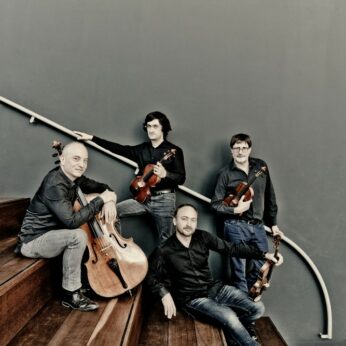Composer: Mieczyslaw Weinberg (b. 1919 - d. 1996)
Performance date: 03/07/2022
Venue: St. Brendan’s Church
Composition Year: 1981
Duration: 00:28:45
Recording Engineer: Simon Cullen, Ergodos
Instrumentation: 2vn, va, vc
Instrumentation Category:String Quartet
Artists:
Quatuor Danel (Marc Danel, Gilles Millet [violins], Vlad Bogdanas [viola], Yovan Markovitch [cello] -
[quartet]

Mieczyslaw Weinberg [1919-1996]
String Quartet No.16 in A flat minor Op.130 [1981]
1. Allegro
2. Allegro – Andantino – Allegro
3. Lento
4. Moderato
This Quartet was written in memory of Weinberg’s sister Ester, whose sixtieth birthday would have fallen on this year. She died during the War along with their parents in a Nazi concentration camp. When Weinberg fled from Warsaw in 1939, Ester came with him part of the way but turned back. It’s not hard to imagine the guilt Weinberg must have felt. As refugees from another European War spread out in their millions, this music tells their story. The intensely personal nature of this Quartet can be heard in the second movement whose second subject is a re-working of a pre-opus number piano work, Mazurkas No.2, from 1933 when Weinberg was fourteen. It would certainly have been a work Ester would have heard him play; beyond that it may have had other personal resonances. Also the music of this Quartet was one of his strongest late period engagements with Jewish music, another link to his long-lost family.
As so often the solo violin introduces the passionate opening theme before cello and viola
take it up. After this idea has been explored the viola leads with a more purposeful theme with a hint of klezmer in the dance. A gradual dramatic intensification leading to new unison passages make up the central phase, a big contrast to his previous Quartet. Shadowy figures introduce the final section with a quiet closure. The Scherzo proper is dominated by a range of fierce scotch snap rhythms. The following Trio section quotes his Mazurka from 1933, both pianissimo and sul tasto (strings bowed over the fingerboard). This very private memorial leads back to a concentrated working out of the main Scherzo. It’s worth noting that as he got older and more and more isolated due to poor health, he looked back increasingly to his Polish origins. One Polish visitor spoke of the phenomenal precision and accuracy of his recall of the prewar streets, cafés and restaurants, also the beautiful perfection of his spoken Polish, typical of the prewar Polish intelligentsia with an extraordinary richness of vocabulary. In this sad but powerful movement we are made feel Weinberg’s sorrow, led initially by the unaccompanied first violin. There are no hesitations or indecision, the music is clear, a cry from the heart, first from the solo violin, building slowly to those places where the sorrow cannot be restrained anymore and is let burst the banks.
The Finale begins with a muted dance, clearly of Jewish origin, to a pizzicato accompaniment, halfway between happiness and sadness. A second theme on the viola to a broken pizzicato limps forward until both ideas suddenly coalesce in a savage outburst with a new stabbing accompaniment. This is the horror of complete loss and when the climax subsides and a kind of calm returns, voices seem to be calling from the depths before the dance starts again and the homage to his little sister ends with haunting irresolution.
Francis Humphrys
Copyright © 2025 West Cork Music. All rights reserved.
Designed and developed by Matrix Internet